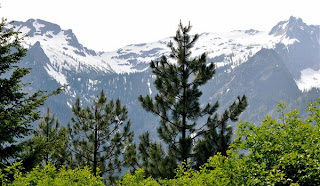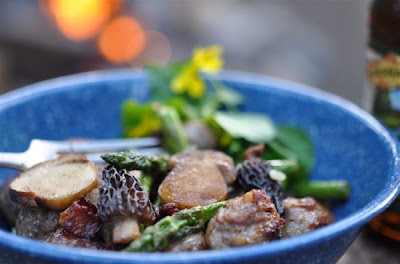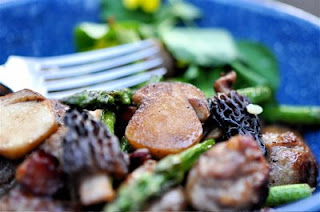 Some may call it heresy, but I’ll say it anyway: I sometimes prefer picking spring porcini to morels. Yes, finding morels is one of the great pleasures of foraging—and eating them is an unparalleled culinary treat. But hunting spring porcini means venturing deeper into more pristine wilderness at a time when the wildflowers are in full bloom and the songbirds in full throat.
Some may call it heresy, but I’ll say it anyway: I sometimes prefer picking spring porcini to morels. Yes, finding morels is one of the great pleasures of foraging—and eating them is an unparalleled culinary treat. But hunting spring porcini means venturing deeper into more pristine wilderness at a time when the wildflowers are in full bloom and the songbirds in full throat.
As with morels, you need an understanding of habitat conditions, tree composition, slope aspect, and so on, making a porcini hunt a challenging puzzle to figure out. I like to spend a few days roaming on the sunny side of the mountains, camping and hiking while I load up on a supply of spring kings to last me through the year.

Usually I’ll start in the lower valleys and work my way up in elevation. Sometimes you don’t see the mushrooms at all; you need to look for a bump in the duff—affectionately known to hunters as a “mushrump”—that signals the growth of a bolete underneath. These are the ones you want, the firm young buttons. They’re also more likely to be bug-free than the older fully emerged mushrooms flapping in the breeze. Which brings me to one of the sad facts of porcini hunting: be prepared to toss a lot of mushrooms. Trim the end or slice in half and you’ll know right away: more than a few will be riddled with worm holes. I try to salvage what I can to dry for later; unblemished buttons get cooked fresh.
Until recently, picking spring porcini mushrooms was like waking up in the morning next to a stranger. A beautiful, nameless stranger. How embarrassing not to know a name! A few proposed appellations floated around the mushroom scene, with none sticking. Some called the mushroom a spring variant of Boletus edulis, others Boletus pinophilus. But the latter was a European species that didn’t seem to fit, and the former is only the most famous bolete of them all, the king bolete, a fall species that differs from its vernal cousin in a few dramatic ways. So most of us just referred to them as “spring kings” and left it at that.
Now David Arora, of Mushrooms Demystified fame, has offered a new name to put an end to the confusion. Boletus rex-veris (from the Latin, meaning “spring king”) would give the mushroom new species status.
 Spring kings differ from true king boletes (B. edulis) in a few striking ways. Most obvious is the timing; spring kings usually start fruiting on the east slopes of the Cascade and Sierra Nevada mountains a few weeks after the morels have started. In my area this means mid-June most years. They fruit underground and often don’t burst through the duff until fully mature, and they can also be found in clusters, sometimes with several specimens fruiting together from the same clump.
Spring kings differ from true king boletes (B. edulis) in a few striking ways. Most obvious is the timing; spring kings usually start fruiting on the east slopes of the Cascade and Sierra Nevada mountains a few weeks after the morels have started. In my area this means mid-June most years. They fruit underground and often don’t burst through the duff until fully mature, and they can also be found in clusters, sometimes with several specimens fruiting together from the same clump.
Some might argue that the spring king is not quite the equal of Boletus edulis, but it has good porcino flavor and can be quite firm and crunchy in the button stage. A few buttons can transform a simple camp dinner into something worthy of the best restaurants.
Camper’s Special Pig & Porcini Feast
3-4 porcini buttons, trimmed and sliced 1/4 -inch thick
5-6 fresh morels, halved
1/2 lb Italian sausage, sliced
2 slices quality bacon, diced
1/2 lb asparagus, cut into thirds
1 cup rice
butter
cream
parmesan cheese
fresh herbs
wild violets for garnish
1. Make rice (or noodles). When done, add butter, cream, parmesan, and fresh herbs to taste for creamy texture. Keep covered.
2. While rice is cooking, saute diced bacon in a dab of butter until crispy. Set aside, leaving bacon fat in pan. Saute mushrooms, turning periodically, until browned. Set aside with bacon. Add sausage to pan and brown, then add asparagus and cook a few more minutes. Return bacon and mushrooms to pan for another minute or two. Serve over rice, then repair to cozy camp chair with a cold, hearty brew and a blazing fire to keep the wild animals at bay.



Oh wow. Mouth officially watering. Thanks for the explanation about worms. I remember buying a gigantic, beautiful spring porcini at the Olympia farmers market last June and being disappointed with how wormy it was. Maybe next time I’ll choose a few smaller ones instead.
You’re killing me with those porcini. My favorite. I’ll take them any day over the morels.
Nice camp dish — and I hear ya on the worms; the slippery jacks we picked a few months ago here in the lower Sierra were loaded with them…
Throw us a bone, Lang – west side, east side, both? About what elevation right now? And do they tend to fruit in the same areas/conditions as the fall porcini?
I’m so jealous! I wish I could forage for mushrooms nearby. Your porcini feast looks amazing.
loving the porcini goodness. I just roasted some this weekend, and they were just amazing.
This might be blasphemy to some, but I way prefer porcini to morels.
GraduallyGreener – Smaller ones are a better choice all around–unless you plan to dry them. The small buttons are firmer, with a nice crunch to them, and they usually have fewer or no bugs. Next time ask the seller to slice the porcino in half before you buy.
Ciao Chow Linda – Wait til you see my Porcini, Pancetta, and Tomato Cream Sauce over Fettucini. Truly to drool over. Future post…
Hank – Bugs love porcini, just like us. This year has been particularly buggy in the North Cascades b/c of the heat wave.
John – The east slopes of the Cascades and Sierra Nevadas are where it’s at. I did a circuit, driving Stevens Pass to Blewett Pass and home over Snoqualmie Pass. Picked btwn 2500-4000 feet, with better specimens at higher elevations. Look for less disturbed forests than where you would normally find morels.
Lisaiscooking – To be honest, I had to do some driving. Spring porcini don’t fruit on the west slopes of the Cascades, so it took me a couple hours to get over the mountains and into the hunting grounds. That’s why I try to combine a camping trip with a porcini hunt.
Matt – You’ve got lots of spring greens in your garden, right? Grill up some sliced porcini (1/4 inch thick), brush on a solution of olive oil, garlic, and herbs, and serve over tender salad greens with your favorite dressing. Perfecto!
Thanks for the tips Lang. I was over in the Methow last weekend looking at higher elevations for morels (no luck) and also had my eye open for the spring kings but didn’t see anything. They have received a fair bit of thunderstorm-produced rain over the last week or so – the ground is quite wet in areas that got rain – so I expect that is a good sign for them. If I have time this weekend I’ll run over that way again and concentrate on the spring kings instead of morels…
Now that’s “roughing it” that anyone could live with.
Nice find and great post, Lang.
Cheers~ Brett
Hey Lang!
Looks like you’re easing into summer in fine fettle – I may have already told you I don’t let a few bugs scare me from a porcini feast – but my bravado was challenged a few years ago when I picked up a pound of dried porcini at Costco (China, of course). Put ’em in my pantry and when I went to use them sev months later, all that was left was a webby powder – apparently,drying doesn’t kill the hardy buggers.
I’ve always preferred the flavor of the Fall porcini; the texture of the spring is great, but I usually have to add some dried Fall ones in order to actually taste anything.